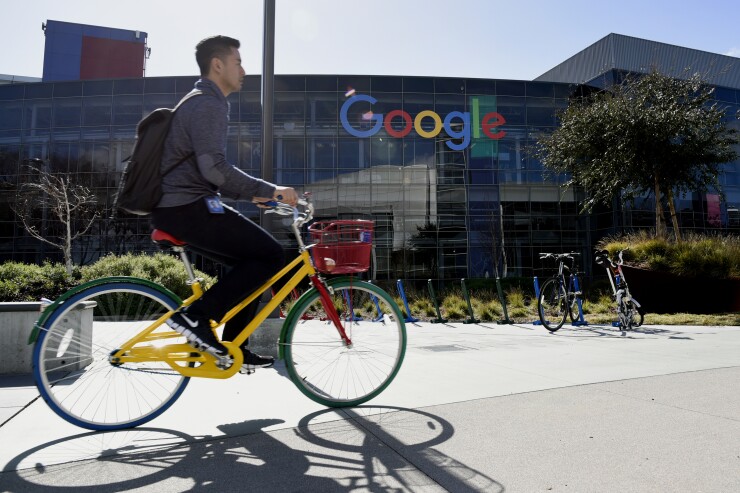Mountain View, California, has seen its economy boom thanks to large employers like Google, but city officials say that growth has also driven the need for more revenue to pay for transportation and housing demands.
The Silicon Valley city is now considering a tax to pay for such improvements under which Google could pay the lion’s share.

It’s not the only tech-company city exploring such options. Other neighboring cities in the Bay Area, including Sunnyvale have explored ways to expand their revenues. In Seattle, the city is considering a $500 tax per employee, which led Amazon to announce that it may halt its expansion plans.
Although Mountain View has a budget surplus, it needs more to pay for hundreds of millions of dollars of needed transportation improvements, Mayor Lenny Siegel said.
“We need to improve the transportation in our community,” he said.
The proposed projects include an elevated, automated guideway that would link the downtown transit center to the main "Googleplex" campus and other businesses in the city’s North Bayshore area. Other plans include improved railroad crossings and bicycle and pedestrian paths.
The city’s budget for fiscal year 2017-2018 is $361.6 million. The city of 79,000 residents has a 2.7% unemployment rate.
Under the plan, the city’s business license fee – a $30 base charge that has not changed since 1985 – would be restructured to function as a “head-count” tax.
Siegel said there’s a correlation between the number of employees at a given company and the number of vehicles on city streets.
“This isn’t intended to be punitive,” he said. “Rather this is a way of working with the companies to solve a problem that affects them as well as the community at large.”
If the city goes forward with the plan, it would need to be approved by voters in a November ballot measure. Siegel said the council would need to make a decision by late June to meet the deadline for the fall election.
A City Council subcommittee discussed the idea at a May 3 meeting. At that meeting, city officials discussed four different models for a tax that ranged from a flat charge per employee to a progressive model with a sliding scale. Under the scenarios, the city could collect between $5 million to $10 million a year, according to
Under one option, Google would end up paying $5.4 million, according to the report.
The Internet giant is the city’s largest employer with 23,324 employees at its sprawling campus, according to the city’s 2017 annual report. The next-largest employer is Symantec with 2,789 employees.
Under one plan, the tax would have a cap on large employers over 10,000 – essentially Google -- under which it would pay $1.5 million instead.
Siegel said he would prefer to keep the tax low for small businesses and focus on mid-sized ones between 1,000 and 3,000 employees. He prefers not to call it a “Google tax,” saying the company contributes a lot to the city in taxes and other ways.
“As corporations go, it’s a good corporate citizen,” Siegel said.
The city is doing outreach with businesses although Google’s response has been “we’ll get back to you,” the mayor said.
Representatives for the company did not respond immediately to a request for comment.
The city polled residents in March and found that nearly two-thirds would back an employer tax focused on transportation projects, according to the staff report.
If the money is earmarked for a specific purpose such as transportation, the measure would need a two-thirds supermajority to pass. However, if the revenue is intended for general city use, only a simple majority would be needed for passage.
While Siegel said he’d like to see the money go mainly for transportation projects, housing is also a priority. He said middle-income residents can’t afford housing in the city and don’t quality for subsidies available for lower-income residents.
“This could be a way to get projects underway for what we call the missing middle,” Siegel said.
The Mountain View Chamber of Commerce has expressed concerns about the proposal and is working with the city on outreach.
Siegel said Mountain View may look at phasing in the tax to soften the blow. But he doesn’t think it will hurt the city.
“I’m concerned in the absence of the projects paid for with the tax we’d lose companies because of insufficient housing and terrible transit,” he said.
Christopher Thornberg, founding partner at Beacon Economics and director of the Center for Economic Forecasting and Development at the University of California, Riverside School of Business, said the proposal shows how even richer cities like Mountain View are under pressure.
“Local governments in California have a big problem on their hands,” he said. “They are getting slowly and surely squeezed.”
He said the main problem is rising employee pension costs that take up more of city resources. He blames traffic problems on the housing shortage in the Bay Area that he said is caused by “NIMBY-ism,” in which "not in my back yard" complainers lead to cities being unwilling to approve enough housing to meet demand.
While Mountain View may not want to call it such, Thornberg said the proposal basically amounts to a Google tax.
“Google is making a ton of money and the city wants to grab a little off the top,” Thornberg said.
The economist said a jobs-dense city like Mountain View can make demands that smaller, more suburban cities couldn’t. Ultimately, he doesn’t see it changing how Google operates in the city.
“It’s already insanely expensive to work in the Bay Area,” Thornberg said. “Housing is expensive, office space is expensive. If the cost was that big a deal they would already move.
“The reality is these companies live in that kind of environment because that’s where they can be most efficient.”





